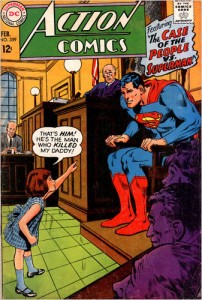Best of the Blogs: Trivial Pursuits Edition
This week’s review of blog postings and news stories of note focuses on subjects that might seem trivial, but that interest me nonetheless.
1. Comic Books
My brother and I had an extensive collection of comic books when we were growing up. We even owned two (two!) mint editions of Conan the Barbarian number 1. If I still owned that collection today, it would easily pay for the first year of my daughter’s college tuition.
After reaching the age of puberty, I consigned my childhood love of comic books to the “trivial” category of youthful pursuits. Perhaps that is why I was so delighted to read about the current exhibit at the Lillian Goldman Law Library at Yale University, entitled Superheroes in Court! Lawyers, Law and Comic Books. As described by John Schwartz in the New York Times, this exhibit includes comic books with a legal setting, contracts and correspondence relating to legal disputes over the ownership of comic book characters, and reports submitted to Congress during the 1950s seeking federal legislation to address the alleged connection between comic books and juvenile delinquency.


